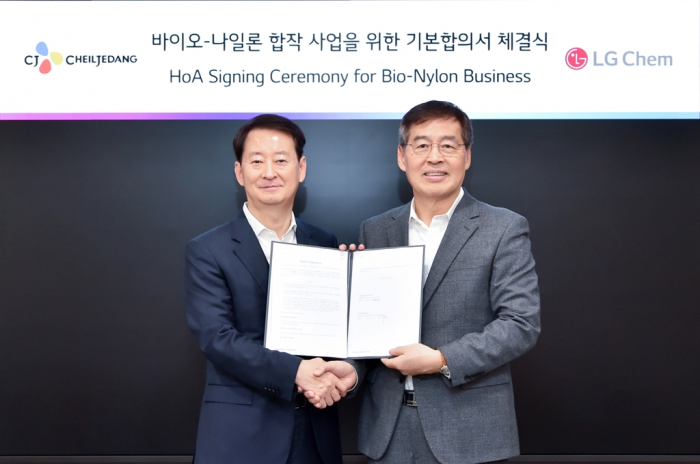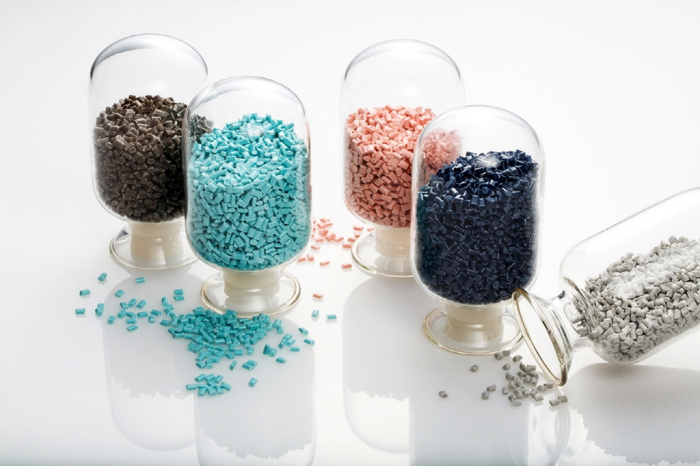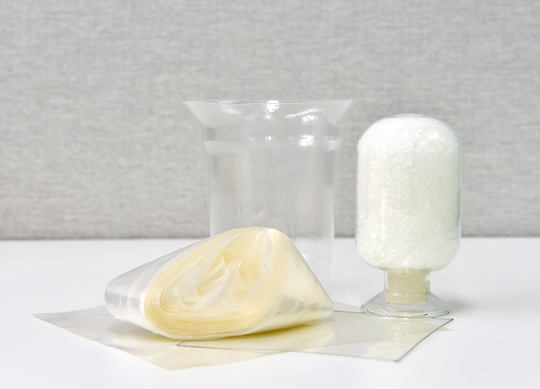Chemical Industry
LG Chem, CJ CheilJedang to launch eco-friendly bio-nylon joint venture
The project comes as the US and Europe are tightening rules, including the mandatory Scope 3 carbon emissions disclosure
By Feb 15, 2024 (Gmt+09:00)
2
Min read
Most Read
LG Chem to sell water filter business to Glenwood PE for $692 million


Kyobo Life poised to buy Japan’s SBI Group-owned savings bank


KT&G eyes overseas M&A after rejecting activist fund's offer


StockX in merger talks with Naver’s online reseller Kream


Mirae Asset to be named Korea Post’s core real estate fund operator



South Korea’s top chemicals maker LG Chem Ltd. and food and biotechnology firm CJ CheilJedang Corp. have agreed to launch an eco-friendly bio-nylon joint venture to create a new revenue source and cut carbon emissions.
The two companies said on Thursday that LG Chem Chief Executive Shin Hak-cheol and CJ CheilJedang CEO Choi Eun-seok have signed a head of agreement (HOA) to build a JV plant to produce eco-friendly nylon based on bio-materials, called PMDA, which are produced by fermenting corn, sugarcane and other crops.
Once up and running, the JV will be Korea’s first bio-nylon project to produce both raw materials and finished products, according to LG.
Under the agreement, CJ will produce PMDA with its microbial precision fermentation technology while LG will polymerize or combine raw materials to produce bio-nylon, also known as bio-polyamide, and sell products.

LG said bio-nylon produced from bio-based materials has the same heat resistance and durability as petroleum-based nylon, making it ideal for use in a wide range of products, including textiles, automobiles and electronic devices, while also significantly reducing carbon emissions.
STRICTER ENVIRONMENTAL RULES
LG said it expects the recent implementation of tougher environmental policies, including the mandatory Scope 3 carbon emissions disclosure in the US and Europe, to drive demand for eco-friendly plastics.
Scope 3 refers to indirect carbon emissions from the production and transportation of purchased materials and the use of sold products.

The company said the growing adoption of “life cycle assessment” evaluations, which measure carbon emissions at each stage of product production in textiles, automobiles and consumer electronics, will also lead to a steady increase in demand for bio-nylon.
Industry estimates show the global bio-nylon market is forecast to grow at an annual average rate of 29% to 1.4 million tons by 2028 from 400,000 tons in 2023.
“This agreement is significant in that it represents cooperation between the two leading companies in their respective fields toward the common goal of net zero,” said LG Chem CEO Shin.
“LG Chem will continue to advance its plastics business using eco-friendly, low-carbon materials.”
Write to Hyung-Kyu Kim at khk@hankyung.com
In-Soo Nam edited this article.
More to Read
-

-
 PetrochemicalsLG Chem unveils eco-friendly bioplastic, supplies to US toy firm Mattel
PetrochemicalsLG Chem unveils eco-friendly bioplastic, supplies to US toy firm MattelDec 05, 2022 (Gmt+09:00)
1 Min read -
 PetrochemicalsLG Chem, ADM to build two bioplastics plants in Illinois
PetrochemicalsLG Chem, ADM to build two bioplastics plants in IllinoisAug 16, 2022 (Gmt+09:00)
2 Min read -
 Mergers & AcquisitionsCJ Cheiljedang to acquire Dutch bio firm Batavia for 195 million euros
Mergers & AcquisitionsCJ Cheiljedang to acquire Dutch bio firm Batavia for 195 million eurosNov 08, 2021 (Gmt+09:00)
2 Min read
Comment 0
LOG IN


